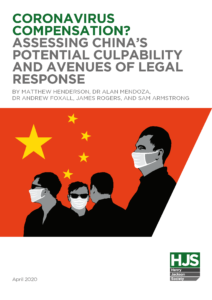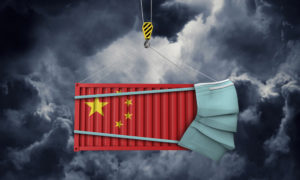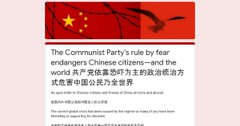 The World Health Organization struggled to get needed information from China during critical early days of the coronavirus pandemic, according to recordings of internal meetings that contradict the organisation’s public praise of Beijing’s response to the outbreak, The Guardian reports:
The World Health Organization struggled to get needed information from China during critical early days of the coronavirus pandemic, according to recordings of internal meetings that contradict the organisation’s public praise of Beijing’s response to the outbreak, The Guardian reports:
The recordings, obtained by the Associated Press (AP), show officials complaining in meetings during the week of 6 January that Beijing was not sharing data needed to evaluate the risk of the virus to the rest of the world. It was not until 20 January that China confirmed coronavirus was contagious and 30 January that the WHO declared a global emergency.
China in fact sat on releasing the genetic map, or genome, of the virus for more than a week after three different government labs had fully decoded the information. Tight controls on information and competition within the Chinese public health system were to blame, according to dozens of interviews and internal documents, the AP observes:
Chinese government labs only released the genome after another lab published it ahead of authorities on a virologist website on Jan. 11. Even then, China stalled for at least two weeks more on providing WHO with detailed data on patients and cases, according to recordings of internal meetings held by the U.N. health agency through January — all at a time when the outbreak arguably might have been dramatically slowed.
A study from the UK’s University of Southampton found that if Beijing had acted just three weeks sooner, the number of covid-19 cases might have been reduced by 95 percent — which would have prevented a pandemic, The Post reports.

NED Forum/shutterstock
Without American guidance and support, the opportunity to build an unassailable alternative to China’s authoritarian capitalism will be lost, according to a new report from the Washington-based Hudson Institute.
China may be a new challenger, but it is dressed in familiar clothing. Like its Soviet progenitor, the Chinese Communist Party (CCP) has instituted an authoritarian system, but with modern, technological accessories. Unlike the Soviets, however, Beijing has absorbed an essential lesson: that communism is no match for capitalism, notes Peter Rough, a senior fellow at the Hudson Institute.
At the same time, China has exploited the conundrum more recent US enemies identified at the turn of the century: how to protect an open society in an era of globalization. Unlike the Soviets,
who established an independent communist zone, China has burrowed deep into the West, establishing interdependencies that double as addictions, he writes in his contribution to A Global Survey of US-China Competition in the Coronavirus Era.
 The past few weeks have seen a concerted Chinese campaign in state-owned media and through Chinese embassies to praise the superiority of the authoritarian approach in managing COVID-19 and to mock the United States and other democracies for alleged incompetence, says John Lee, a senior fellow at the Hudson Institute.
The past few weeks have seen a concerted Chinese campaign in state-owned media and through Chinese embassies to praise the superiority of the authoritarian approach in managing COVID-19 and to mock the United States and other democracies for alleged incompetence, says John Lee, a senior fellow at the Hudson Institute.
- The United States must go on the offensive in defining how the region and world speak about, and remember, the COVID-19 situation as it unfolded in the first six months of the year. It makes good strategic- messaging and ethical sense to address this issue, because truth and facts will work against Beijing.
- The US attempt to label the new virus the “Wuhan coronavirus” was an early attempt to remind the world of the recklessness of the Communist Party in allowing the virus to spread, but it suffered from a lack of coordination with allies and partners who
were not consulted on the timing or intent behind it. - A more promising and constructive approach is the one suggested by Prime Minister Scott Morrison of Australia: an independent international inquiry about the origins and
early spread of COVID-19, a call quickly endorsed by the United States. - Europe has indicated it will support such an inquiry. The priority should be to ensure that governments in Japan and South Korea are on board and that the matter of timing does not
undermine united calls to push for such an inquiry.
 Just as containing China is growing more important to the United States than rebalancing the relationship with Europe, US allies are learning that maintaining the liberal democratic order demands real sacrifice from them, too, adds Rough.
Just as containing China is growing more important to the United States than rebalancing the relationship with Europe, US allies are learning that maintaining the liberal democratic order demands real sacrifice from them, too, adds Rough.
Meantime, the US and other advanced democracies should ensure their business and technological exchange with China is no longer abetting the construction of the CCP’s police state, says Hudson’s Eric Brown. RTWT







